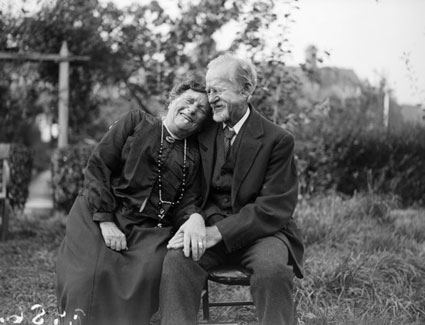Family as Torn Veil

Alexander Schmemann writes:
“O Lord our God, crown them with glory and honour!” says the priest after he has put the crowns on the heads of the bridal pair. This is, first the glory and honour of man as king of creation: “Be fruitful and multiply and replenish the earth, and subdue and have dominion…” (Gn. 1:25). Each family is indeed a kingdom, a little church, and therefore a sacrament of and a way to the Kingdom. Somewhere, even if it is only in a single room, every man at some point in his life has his own small kingdom. It may be hell, and a place of betrayal, or it may not. Behind each window there is a little world going on. How evident this becomes when one is riding on a train at night and passing innumerable lighted windows: behind each one of them the fullness of life is a “given possibility,” a promise, a vision. This is what the marriage crowns express: that here is the beginning of a small kingdom which can be something like the true Kingdom. The chance will be lost, perhaps even in one night; but at this moment it is still an open possibility. Yet even when it has been lost, and lsot again a thousand times, still if two people stay together, they are in a real sense king and queen to each other. And after forty odd years, Adam can still turn and see Eve standing beside him, in a unity with himself which in some small way at least proclaims the love of God’s Kingdom. In movies and magazines the “icon” of marriage is always a youthful couple. But once, in the light and warmth of an autumn afternoon, this writer saw on the bench of a public square, in a poor Parisian suburb, an old and poor couple. They were sitting hand in hand, in silence, enjoying the pale light, the last warmth of the season. In silence: all words had been said, all passion exhausted, all storms at peace. The whole life was behind—yet all of it was now present, in this silence, in this light, in this warmth, in tis silent unity of hands. Present—and ready for eternity, ripe for joy. This to me remains the vision of marriage, of its heavenly beauty.
Then secondly, the glory and and the honour is that of the martyr’s crown. For the way to the Kingdom is the martyria—bearing witness to Christ. And this means crucifixion and suffering. A marriage which does not constantly crucify its own selfishness and self-sufficiency, which does not “die to itself” that it may point beyond itself, is not a Christian marriage. The real sin of marriage today is not adultery or lack of “adjustment” or “mental cruelty.” It is the idolisation of the family itself, the refusal to understand marriage as directed toward the Kingdom of God. This is expressed in the sentiment that one would “do anything” for his family, even steal. The family here has ceased to be for the glory of God; it has ceased to be a sacramental entrance into His presence. It is not the lack of respect for the family that breaks the modern family, it is the idolisation of the family that breaks the modern family so easily, making divorce its almost natural shadow. It is the identification of marriage with happiness and the refusal to accept the cross in it. In a Christian marriage, in fact, three are married; and the united loyalty of the two toward the third, who is God, keeps the two in an active unity with each other as well as with God. Yet it is the presence of God which is the death of the marriage as something only “natural.” It is the cross of Christ that brings the self-suficiency of nature to its end. But “by the cross, joy [and not "happiness!"] entered the whole world.” Its presence is thus the real joy of marriage. It is the joyful certitude that the marriage vow, in the perspective of the eternal Kingdom, is not taken “until death part,” but until death unites us completely.
– For the Life of the World, p. 89-91.
See Marriage as a Promise of Wine for some related thoughts.

























